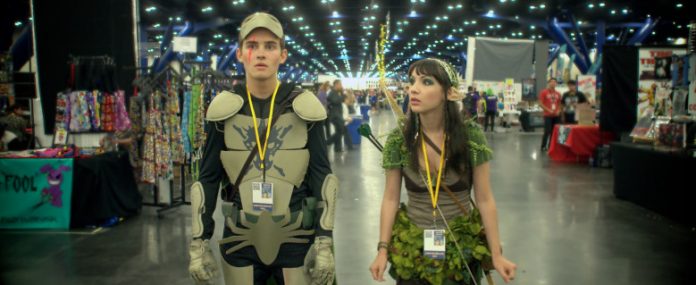When 15-year-old freshman Neil (Michael Johnson) is exposed as a Vanguard obsessive and his erotic fan fiction disseminated around the classroom, he finds a kindred spirit in Julia (Hannah Marks), a prolific poster to an online forum who cosplays as an elf when she isn’t scribbling stories of her own. Sensing his latent writing talent, she encourages him to start submitting his work to the site too, leading them both to a convention in Austin where a select few are invited to read their work. Having lied about their ages to gain access to the forum, however, Neil and Julia will have to convince site moderator Denis (Michael Ian Black) that they are old enough to attend in real life.
Although fan fiction has had a long and surprisingly illustrious history, with the Brontë sisters having recently been revealed to have dabbled in the medium themselves, populating their own fantastical worlds with characters from then-contemporary fiction and current affairs, today the practice is often treated with scorn and derision, more likely to bring to mind Twilight derivative 50 Shades of Grey than anything even nominally literary. This is largely due to the often highly sexualised nature of these unlicensed spin-offs, as in the case of the slash sub-genre, which imagines same-sex liaisons between generally heterosexual characters, whether they belong in the same fictional universe or not.
Enter Slash, the movie, a coming-of-age drama from writer-director Clay Liford that takes a rather more innocent view of something often deemed deviant or perverted. In Slash, the titular sub-genre is presented simply as an innocuous platform for closeted or confused teens to try to make sense of their sexual identity – an inner conflict that, as the existence of an adults-only convention might suggest, isn’t always resolved by the end of adolescence. Liford attempts to capture the chaotic and complex nature of human sexuality, as Neil attempts to reconcile polysexual fantasies with his heteronormative feelings towards Julia, and Julia, eager to distance herself from an unhealthy relationship with an older boyfriend, tabulates through the catalogue of prescribed orientations in search of one that fits.
Both Johnson and Marks are tremendously endearing in the lead roles, especially when they share the screen, with the latter proving particularly engaging as Julia, whose manufactured maturity can’t quite mask her unmistakable naivety. Given the apparent strangeness of the subject matter — much of Neil’s Vanguard-inspired short, Shore Leave, is enacted onscreen by actors Tishuan Scott and Dakota Morrissey — it is impressive just how genuine and grounded the main narrative performances feel. Neil’s relationship with his parents is beautifully observed, while Julia’s friendship with the very pregnant Martine (Jennie Ennis) produces some of the sharpest dialogue you’re likely to hear outside of a Diablo Cody script, only without sounding quite as self-conscious or stylised. As the more established actor, Black takes on the most challenging role, and succeeds in keeping proceedings sweet and sympathetic even as the story threatens to take a more sinister twist.
Both knowing and nuanced, Slash brilliantly bisects the worlds of fantasy and reality, such that the sensitive treatment of Neil’s rites of passage is never undermined or overshadowed by the heightened bombast of Vanguard’s science fiction interludes, even as it starts to spill out into the real world during the convention-set last act. As a disheartened Neil rides the elevator following an argument with Julia you almost don’t notice the half-naked wolf-man speaking on the phone behind him. Almost.








